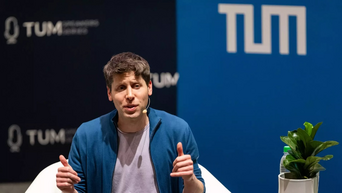
Rarely has a technology sparked such intense discussion as ChatGPT, the artificial intelligence (AI)-based chatbot. The brain behind it and co-founder of OpenAI, Sam Altman, visited TUM on May 25th, 2023. In the Audimax, he explained the reasons for its success, why ChatGPT is not an open source technology, and how it could be regulated.
After less than half an hour, the 1,100-seat Audimax was sold out for the 38-year-old's only public event in Germany during his European tour. Under questioning from Reinhard Heckel, professor of machine learning, Sam Altman, along with OpenAI developer Johannes Heidecke, recounted the evolution of the language model to its current fourth version. "Even with GPT-3, the whole company wasn't convinced," Altman said. The key to its success, he said, is its natural language chat capability, which provides an even better human-computer interface than the touchscreen. However, ChatGPT is still misunderstood as a large database, he said.
Altman explained why OpenAI made the technology available to the public early on, following a "show, don't tell" approach: "We feel strongly that we should educate the world about it and give people time to gradually adapt to the technology”. That way, he said, there can be a discussion about how to deal with artificial intelligence. This, he said, is better than keeping technologies secret in the lab for a long time because it would supposedly scare people into releasing them too soon.
International regulatory framework
Altman drew the line at calls from the audience to make the code open source, that is, available for use and reuse. "When we open source something, we want to be relatively sure that we understand its capabilities and its impact on society - because we can't take it back”. Fundamentally, he said, people need to retain control over technology.
Altman also commented on the regulation of artificial intelligence, saying, "Some kind of international framework is a very good idea, and we should start as soon as possible." The CEO cited the work of the International Atomic Energy Agency as an example. Altman argued against a pause in the development of powerful AI, which other entrepreneurs have recently called for. OpenAI now wants to learn what values and boundaries users want for ChatGPT and how the system should be adapted depending on the country, legislation and culture, he said.
"The best time for a career in technology"
When asked about the differences between the tech industry in the U.S. and Europe, Altman emphasized the much greater American willingness to take risks: "It's socially acceptable to work on something super ambitious." If you fail, people don't laugh at you. But students in Europe shouldn't be discouraged: "Now is the best time to start a career in tech."
During Altman's welcome address, TUM President Thomas F. Hofmann had emphasized how fundamentally the new generation of generative AI will change the entire civilization. "We have to make sure that we don't pay the highest price for these developments: humanity and self-determination."
TUM and the TUM Speakers Series organized the event together with Digital Life Design (DLD).